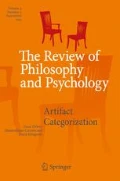Abstract
Recent theories of epistemic contextualism have challenged traditional invariantist positions in epistemology by claiming that the truth conditions of knowledge attributions fluctuate between conversational contexts. Contextualists often garner support for this view by appealing to folk intuitions regarding ordinary knowledge practices. Proposed is an experiment designed to test the descriptive conditions upon which these types of contextualist defenses rely. In the cases tested, the folk pattern of knowledge attribution runs contrary to what contextualism predicts. While preliminary, these data inspire prima facie skepticism for the contextualist hypothesis regarding folk knowledge claims, as well as challenge certain predictions made by recent theories of subject-sensitive invariantism. It is further argued that such results raise methodological questions concerning the practice of relying on an assumption of intuitions, with respect to ordinary language practices, as evidence for philosophical conclusions regarding knowledge.
Similar content being viewed by others
Notes
Machery et al. 2004 shows cross-cultural variation among semantic intuitions regarding theories of reference, suggesting “it is wrong for philosophers to assume a priori the universality of their own semantic intuitions.” Famously, Weinberg et al. 2001 shows that such divergence of intuition extends to the epistemic domain.
Debate (see DeRose 2000) has risen over the so-called abominable conjunction (the troubling proposition “I know and I don’t know”) that seems to follow from the union of contextualist thought experiments.
Interestingly, these cases are hardly ever considered individually, they are instead often presented in tandem to motivate a contextualist intuition.
Interestingly, probes in pilot studies related to this experiment never explicitly mentioned the fact that the bank was open as Bruno claimed, i.e. “When they return to the bank on Saturday morning, it is open for business.” However, even in these cases, participants still strongly attributed this knowledge to Bruno. Philosophically, this may suggest that folk knowledge attribution is not as sensitive to the absence of an explicit mention of the actual truth of a belief as philosophers have since thought.
This scoring method did not prevent participants from writing their own responses in addition to using the scale provided. For instance, on a substantial number of surveys in each condition, participants often underlined Bruno’s statement, “I was just here last week” and “I know that the bank will be open on Saturday,” possibly signaling that they simply accept the subject’s evidence and testimony as warranting across the board. Furthermore, on many surveys participants also wrote things like, “He’s [Bruno] just being lazy” and “He just doesn’t want to wait in line.” These write-ins were often accompanied by responses below 3 (regardless of the survey type), perhaps suggesting that surprising non-epistemic factors can influence ordinary subjects’ inclinations to attribute or deny knowledge to others (see Beebe and Wesley Buckwalter forthcoming).
In Bank, 27 (or 14.8%) disagreed with the statement and 20 (or 10.9%) remained neutral. In High Stakes, 30 (or 16.6%) disagreed with the statement and 27 (or 14.9%) remained neutral.
Differences are not significant between groups, t (362) = .987, p = .243, as well as significantly above 3, p < .01.
In High Standards, 34 (or 18.9%) disagreed with the statement and 27 (or 15%) remained neutral.
Differences are not significant between groups, t (361) = 1.637, p = .140, as well as significantly greater than 3, p < .01.
For further research done in this area and subject-sensitive invariantism, see May et al. 2009.
Special thanks to James Beebe and Neil Williams for helpful comments on earlier drafts of this paper, and to my colleagues at the University at Buffalo for their support. This material is based upon work supported by National Science Foundation Grant No. DGE 0333417 awarded to the University at Buffalo.
References
Beebe, James, and Wesley Buckwalter. 2010. The epistemic side-effect effect. Mind and Language (forthcoming).
Cohen, Stewart. 1986. Knowledge and context. Journal of Philosophy 83: 574–583.
Cohen, Stewart. 1998. Contextualist solutions to epistemological problems: Skepticism, gettier, and the lottery. Australasian Journal of Philosophy 76: 289–306.
Cohen, Stewart. 1999. Contextualism, skepticism, and the structure of reasons. Philosophical Perspectives 13: 58.
Cohen, Stewart. 2000. Contextualism and skepticism. Philosophical Issues 10: 94–107.
DeRose, Keith. 1992. Contextualism and knowledge attributions. Philosophy and Phenomenological Research 52(4): 913–929.
DeRose, Keith. 1995. Solving the skeptical problem. Philosophical Review, 1–52.
DeRose, Keith. 2000. Now you know it, now you don’t. Paper presented at the proceedings of the Twentieth World Congress of Philosophy, Bowling Green, Ohio. Philosophy Documentation Center, Vol. V, Epistemology. pp. 91–106.
DeRose, Keith. 2005. The ordinary language basis for contextualism and the new invariantism. The Philosophical Quarterly 55(219): 172–198.
Doris, John, Stephen Stich, Frank Jackson, and Michael Smith. 2005. As a matter of fact: Empirical perspectives on ethics. In The Oxford handbook of contemporary philosophy, 114–152. Oxford: Oxford University Press.
Hawthorne, John. 2004. Knowledge and lotteries. Oxford: Oxford University Press.
Lewis, D. 1996. Elusive knowledge. Australasian Journal of Philosophy 74: 549–567.
Lewis, David. 1979. Scorekeeping in a language game. Journal of Philosophical Logic, 339–359.
Machery, Edouard, Ron Mallon, Shaun Nichols, and Stephen Stich. 2004. Semantics, cross-cultural style. Cognition 92: B9.
May, Joshua, Walter Sinnott-Armstrong, Jay G. Hull, and Aaron Zimmerman. 2010. Practical interests, relevant alternatives, and knowledge attributions: An empirical study. Review of Philosophy & Psychology, 1(3).
Nichols, Joshua. 2004. Folk concepts and intuitions: from philosophy to cognitive science. Trends in Cognitive Science 8: 513–518.
Stanley, Jason. 2005. Knowledge and practical interest. Oxford: Oxford University Press.
Weinberg, Jonathan, Shaun Nichols, and Stephen Stich. 2001. Normativity and epistemic intuitions. Philosophical Topics 29: 429–460.
Author information
Authors and Affiliations
Corresponding author
Rights and permissions
About this article
Cite this article
Buckwalter, W. Knowledge Isn’t Closed on Saturday: A Study in Ordinary Language. Rev.Phil.Psych. 1, 395–406 (2010). https://doi.org/10.1007/s13164-010-0030-3
Published:
Issue Date:
DOI: https://doi.org/10.1007/s13164-010-0030-3




